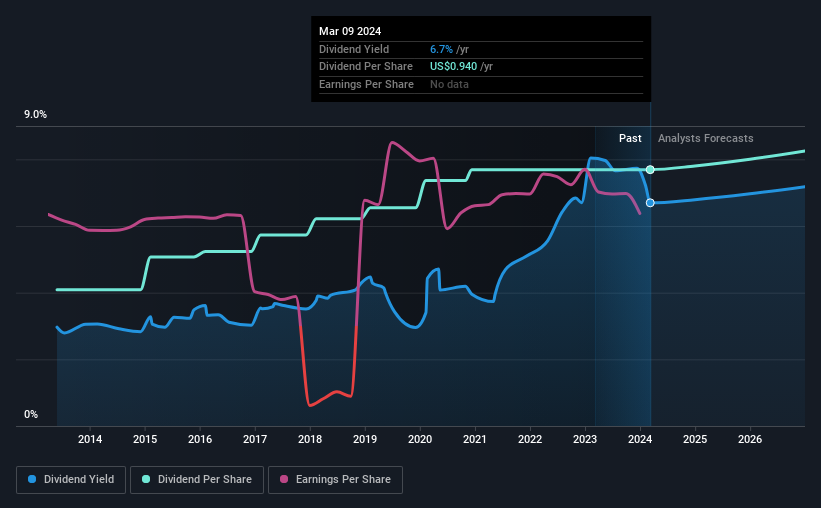Don't Race Out To Buy The Western Union Company (NYSE:WU) Just Because It's Going Ex-Dividend
It looks like The Western Union Company (NYSE:WU) is about to go ex-dividend in the next 4 days. Typically, the ex-dividend date is one business day before the record date which is the date on which a company determines the shareholders eligible to receive a dividend. The ex-dividend date is important because any transaction on a stock needs to have been settled before the record date in order to be eligible for a dividend. Thus, you can purchase Western Union's shares before the 14th of March in order to receive the dividend, which the company will pay on the 29th of March.
The company's next dividend payment will be US$0.235 per share. Last year, in total, the company distributed US$0.94 to shareholders. Based on the last year's worth of payments, Western Union has a trailing yield of 6.7% on the current stock price of US$14.04. Dividends are a major contributor to investment returns for long term holders, but only if the dividend continues to be paid. So we need to investigate whether Western Union can afford its dividend, and if the dividend could grow.
See our latest analysis for Western Union
Dividends are typically paid from company earnings. If a company pays more in dividends than it earned in profit, then the dividend could be unsustainable. Western Union is paying out an acceptable 56% of its profit, a common payout level among most companies.
When a company paid out less in dividends than it earned in profit, this generally suggests its dividend is affordable. The lower the % of its profit that it pays out, the greater the margin of safety for the dividend if the business enters a downturn.
Click here to see the company's payout ratio, plus analyst estimates of its future dividends.
Have Earnings And Dividends Been Growing?
Stocks with flat earnings can still be attractive dividend payers, but it is important to be more conservative with your approach and demand a greater margin for safety when it comes to dividend sustainability. If earnings fall far enough, the company could be forced to cut its dividend. That explains why we're not overly excited about Western Union's flat earnings over the past five years. We'd take that over an earnings decline any day, but in the long run, the best dividend stocks all grow their earnings per share.
Many investors will assess a company's dividend performance by evaluating how much the dividend payments have changed over time. Since the start of our data, 10 years ago, Western Union has lifted its dividend by approximately 6.5% a year on average.
Final Takeaway
Is Western Union worth buying for its dividend? Western Union's earnings per share have been essentially flat, and the company is paying out more than half of its earnings as dividends to shareholders. All things considered, we're not optimistic about its dividend prospects, and would be inclined to leave it on the shelf for now.
Although, if you're still interested in Western Union and want to know more, you'll find it very useful to know what risks this stock faces. For example, Western Union has 2 warning signs (and 1 which makes us a bit uncomfortable) we think you should know about.
Generally, we wouldn't recommend just buying the first dividend stock you see. Here's a curated list of interesting stocks that are strong dividend payers.
Have feedback on this article? Concerned about the content? Get in touch with us directly. Alternatively, email editorial-team (at) simplywallst.com.
This article by Simply Wall St is general in nature. We provide commentary based on historical data and analyst forecasts only using an unbiased methodology and our articles are not intended to be financial advice. It does not constitute a recommendation to buy or sell any stock, and does not take account of your objectives, or your financial situation. We aim to bring you long-term focused analysis driven by fundamental data. Note that our analysis may not factor in the latest price-sensitive company announcements or qualitative material. Simply Wall St has no position in any stocks mentioned.

